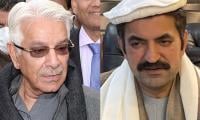KARACHI: It has been over 14 years since the killing of over 50 citizens in the May 12, 2007, violence in Karachi, yet no culprit has been brought to justice nor has any fact-finding commission concluded its inquiry into the deadly incidents of that day, one of the blackest in the judicial history of the country.
More than 50 people were killed in different parts of the city during attacks on rallies staged by political parties and lawyers on May 12, 2007, to welcome then deposed chief justice of Pakistan (CJP) Iftikhar Mohammad Chaudhry on his arrival to the city.
The Sindh High Court had however upheld the principle of the public’s right to information and ordered the Sindh government to constitute an inquiry tribunal headed by a sitting or retired high court judge to probe the violent incidents, which occurred over 14 years ago, but the orders of the court were not complied with in letter and spirit.
The SHC also framed a 13-point terms of reference for the inquiry in its September 11, 2018 order and observed that the tribunal shall complete the inquiry within three months, but no efforts have been made yet by the government yet in this regard.
The court had observed that May 12, 2007 incidents were one of the blackest days in the history of Karachi, which has seen much turmoil in respect of the legal community and the public’s fundamental right to unhindered access to justice, especially when the court had directed federal and provincial governments to provide foolproof security arrangements for the visit of the deposed CJP.
The court had said the public must have confidence that their fundamental right to access to justice must be maintained under all circumstances.
Its order stated that it has to be probed whether those at the helm of affairs who had command and control responsibility on and before May 12, 2007, bore any responsibility for the incidents which led to a denial of access to justice to citizens, a complete breakdown in the law and order in the country’s commercial hub, cost many precious lives, injured many others, caused millions of rupees in damage to private and public property and led to an attack on the independence of the media.
The high court had also expressed dissatisfaction over the criminal proceedings against the May 12 culprits by the provincial government, and observed that “hardly any of the big fish who were part of the command and control structure in Karachi on May 12, 2007 had been named in any FIR or was facing any kind of proceedings”.
The court had noted down in its judgment that it was apparent that after 11 years of the incident, either through inefficiency or design, the investigation agencies, the prosecution department and the anti- terrorism courts (ATCs) had miserably failed to discharge their duties in deciding these important cases for reasons best known to themselves.
The court had observed that the way in which 65 cases had been dealt with, investigated, prosecuted and tried was “completely unacceptable” and that despite all the videos, TV footage and other material available as evidence it seemed quite astonishing that so many cases had been disposed of in A class (non-arrest of culprits).
It had further said that the events of that day still remained to be fairly, properly and independently inquired into and responsibility remains to be fixed on those responsible for any lapses on May 12, 2007 before or during the incidents. The court observed that the nomination of a few small fish in 65 FIRs did not get to the heart/root of the issue.
It had ordered the constitution of a joint investigation team under Section 19 of the Anti-Terrorism Act to trace all the persons involved in A class cases and make further investigations in all other cases related to the incidents.
The court had observed that although 11 years had passed after May 12, 2007 incidents, this was no reason not to at least attempt to try to uncover the truth which the public had a right to know. Justifying the probe, it had observed that former prime minister Nawaz Sharif was convicted of an offence 20 years back, while in Britain the police officers who failed in duties in the traffic Hillsborough football stadium incident at Sheffield had been finally brought to court to face justice.
The court had remarked that the public had a right to know whether some persons at the helm of affairs in Sindh, in violation of the court orders, had deliberately put in place a plan to ensure that the deposed CJP was not allowed to leave Karachi Airport and reach the Malir district court and the SHC and why the police and Rangers were virtual spectators while the city was overrun by miscreants and complete access to justice was denied to the public and with the legal fraternity being particularly targeted.
The high court had observed that the public also had the right to know what role the federal government played in the planning or unfolding of the incident, and what was the role of the coalition government in Sindh, as it appeared from the record that activists of the Muttahida Qaumi Movement or any other political party or group largely terrorised the public and especially lawyers on that day.Shopkeepers, others arrested over SOPs breach
By Our correspondent
LAHORE: District administration continued its operations against violation of corona SOPs and arrested several shopkeepers and citizens besides sealing many businesses here Tuesday.
Deputy Commissioner Lahore Mudassar Riaz visited Chungi Amar Sadhu Bazaar where he found majority of shops opened. Following his instructions, over a dozen shops were immediately sealed and shop owners were detained.
Meanwhile, AC Raiwind Adnan Rashid raided a bakery’s manufacturing unit on Raiwind Road and sealed the warehouse because the factory management had failed to give the trail of sugar bags.
DC Lahore has directed all the assistant commissioners to remain in the field and take strict action where the shop or market was open.
Senator Saleem Mandviwala apprised Bilawal of the issues in the Senate
Rabbani said the report of Faizabad Commission chose to close the matter while avoiding further controversy and...
He said political stability is a must for capitalizing on this rare opportunity in the form of Saudi Arabia’s...
At the moment, the foundation is managing 13 model emergency rooms across the country
The report states that due to importation of expensive wheat by government agencies, the national exchequer lost 31.32...
The fashion designer marked her attendance and assured the court that she would appear at each hearing of the case







